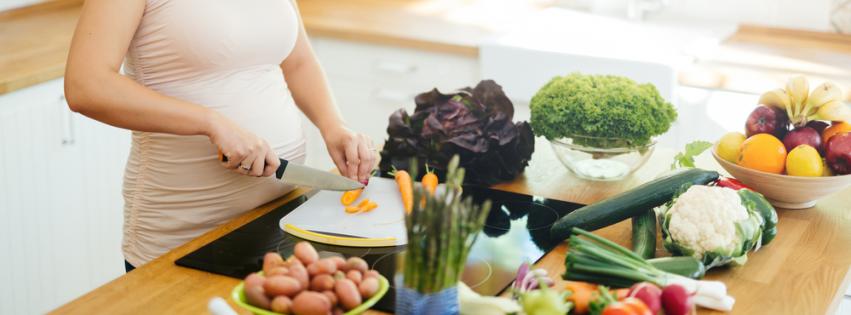Eating nutritious foods is important during pregnancy, but all of the “do’s” and “don’ts” during pregnancy can be overwhelming. Science-based recommendations can help set you and your baby up for the best possible health outcomes. But remember there is no “one size fits all” answer, especially while pregnant. It is important to keep this in mind and to speak up for your own needs as well as your baby’s. Read more below to learn about important vitamins and foods during pregnancy.
Eating for Two? Calorie Intake and Weight Gain During Pregnancy
We often hear that pregnant women are “eating for two.” However, this can be misleading as an expecting mom because you do not literally require double the amount of calories. In fact, the average pregnant woman only requires an additional 300-400 calories each day. This is usually the same as one or two healthy snacks over the course of the day, or one additional small meal. Examples may include an apple and peanut butter, cheese and a handful of almonds, or other similar combinations.
But remember there is no “one size fits all” answer, especially while pregnant.
Even with a balanced diet, weight gain during pregnancy is completely normal. Most experts recommend gaining weight gradually, with most of your weight gain taking place in the third trimester or the last three months of pregnancy. Personal factors such as pre-pregnancy fitness routine and body mass index (BMI) will impact your own range for a healthy total weight gain. Generally speaking, the recommended weight gain ranges from 25 to 35 pounds for women with a “healthy” range BMI prior to becoming pregnant and with a singleton pregnancy (one child). However, keep in mind that preferred calorie intake and weight gain varies. It is always a good idea to talk to your healthcare provider for personalized recommendations.
Important Foods
During pregnancy, it is vital to maintain a healthy diet just as you would before becoming pregnant. If you don’t have allergies or other restrictions, it is important to eat a balanced diet with all the major food groups – proteins, grains, fruits, vegetables, and dairy. During pregnancy, you may find that you need more of certain types of food in order to get the nutrients that you and your growing child require for optimal health.
1. Proteins: Meat/Seafood
- Meat and fish are easy and healthy ways to include protein in your diet. Proteins are responsible for growing, maintaining, and repairing muscles and other tissues. They will be especially necessary during pregnancy in order to help your body repair tissues that are growing and stretching as well as help your baby build new tissues as it grows. Leading sources of healthy protein include: lean red meat, poultry, fish, seafood, and eggs.
- Foods in this category are also often a good source of iron. Iron is vital to ensuring your body has enough red blood cells so that both you and your baby can get enough oxygen. Iron is most abundantly found in red meat, but it can also be found in fortified breakfast cereals and leafy greens like spinach.
- Omega-3 fatty acids and vitamin D are often found in seafood (and in seaweed and walnuts in smaller amounts). Vitamin D is necessary to help your body absorb and use the calcium you may have consumed. Omega-3s are very important for your health as well as for your baby’s brain and eye development. Omega-3 fatty acids are most easily obtained through most types of seafood, and experts recommend eating 2-3 seafood meals each week during pregnancy. Read more about the benefits of eating fish and seafood here.
- For vegetarians and those with other restrictions, there are plenty of alternative, plant-based sources including: tree nuts, tofu, beans, and rice. Those without any restrictions should eat a varied diet of as many of these types of healthy proteins as possible each week.
2. Grains
- The grains food group includes many healthy foods ranging from bread to rice, cereals, and pastas. Different types of grains are important to you and your baby’s health in different ways. For example, rice, oatmeal and quinoa are good plant-based sources of protein. Breads and cereals, on the other hand, are often fortified with extra nutrients, such as folic acid and iron. Whole grain options are often most nutrient-dense.
- Folic acid is particularly important during pregnancy, especially during the first 28 days, as it has been shown to significantly decrease the risk of developing certain birth defects.
3. Dairy
- Dairy is one of the best ways to get enough calcium to support bone growth and strong teeth for you and baby. Calcium can most commonly be found in milk, cheeses, and yogurt. Alternative, plant-based sources include leafy greens, such as spinach.
- Some dairy products can also serve as a source of vitamin D. Vitamin D is required to help you and your child absorb calcium and can be most abundantly be found in sunlight. However, most milks and cheeses are also fortified with extra vitamin D. You can find vitamin D fortification information on product labels.
4. Vegetables
- As a source of many valuable vitamins, vegetables are an important part of any balanced diet, especially during pregnancy. Experts recommend eating as many fruits and vegetables as possible during pregnancy. A good rule of thumb? Fill half your plate at meals with colorful fresh foods whenever possible.
- Leafy and dark green vegetables, such as spinach, kale, brussel sprouts, and asparagus, are especially important because they provide lots of folic acid, iron, and calcium.
- All vegetables are a good source of fiber, but foods like potatoes and peas are particularly high in fiber, which supports digestion and reduces constipation during pregnancy.
- Some vegetables are also high in protein. Corn, beans, and soy products (such as edamame or tofu) are rich with nutrients and filling proteins.
5. Fruits
- Similar to vegetables, fruit is rich in nutrients and is important to incorporate into your pregnancy diet. Some of the most common nutrients found in fresh fruit include vitamin D, vitamin C, folic acid, potassium, and fiber. Fresh fruit can also be a healthy alternative to satisfying cravings for sweet treats.
- Citrus fruits, including oranges, lemons, limes, and grapefruit, are abundant sources of folic acid and vitamin C. Some orange juices are also fortified with extra vitamin D, but citrus fruits are not the only source of these nutrients. Vitamin C, which helps your immune system fight off colds and other illnesses, can also be found in a mangoes, avocados, apricots and bananas.
- Folic acid, on the other hand, can be found in pears, avocados, and strawberries.
- Fruit is also an important source of fiber. Fibrous fruits include apples, bananas, pears, and avocados.
Pregnancy Cravings
Many women describe craving uncommon food combinations or foods that they previously did not care for prior to pregnancy. Experts do not fully understand why these cravings occur, although some reasons may be related to shifting hormone levels and nutritional needs.
It is important to maintain a balanced diet while listening to your body. Giving in to a craving for pickles or a modest portion of ice cream is not harmful; however, if you are experiencing cravings for potentially toxic, non-food substances such as dirt, chalk or laundry starch, consult with your healthcare provider as soon as possible.
WIC Resources
Navigating your diet during pregnancy can be difficult even under the best of circumstances. But it can be even harder when you worry about finding or paying for fresh fruits and vegetables or lean, healthy meats and seafood.
The Women, Infants and Children (WIC) Food and Nutrition Service is a program designed to help pregnant women and their children achieve the best possible outcomes by providing food, food supplements, nutrition education, trainings, and/or health care referrals. To find services in your area or to see if you may be eligible to benefit from this program, visit their website.
You Know Yourself Best
While pregnant, it is important to be informed, but also know that, especially when it comes to nutritional advice, everything depends on the individual and their family! As always, check with your healthcare provider and remember to trust your instincts. Don’t be afraid to speak up for your own needs or ask questions.







